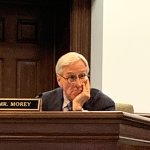OCEAN CITY – Richard “Dick” Mathers doesn’t want the “Forgotten War” to be whisked from memories. To keep alive the hell many experienced there, he spoke to Sons of American Legion Squadron 524 July 24 at the American Legion post on Bay Avenue.
It was his Mathers’ second address of the year on the topic that swept him away from his Philadelphia home and planted him in the sweltering heat and unimaginable cold of Korea in 1953.
The 82-year-old Ocean City resident addressed a group of about 35 who traveled to hear what Korean War veterans encountered.
Mathers cited “Korean Reborn A Grateful Nation,” a thank you to the United States, 20 copies of which were sent to him after his January address about the war at the Woodbine American Legion post. The book is dedicated to all Korean War veterans, with a letter from President Park Geun-hye, of the Republic of Korea.
To Mathers, the rebirth of South Korea was made possible, in part, by those, like himself, who fought to make the nation free, but also by the invincible spirit of the people of Korea. He noted their enormous strides in becoming a prosperous, industrialized nation after being a slave state of Japan for 40 years and then the war.
“The Republic of Korea, one dependent is well positioned to contribute to others around the world. The blood, sweat and tears shed by veterans of the Korean War sowed the seeds of today’s freedom, peace, prosperity and plenty,” the president wrote, and Mathers quoted.
The war, Mathers said, “Was fought by many military personnel who also fought in World War II, a group called The Greatest Generation. It was a terrible war in a terrible place where the temperature reached 30 below zero, bullets, frostbite and disease,” he said.
Mathers also noted it was “the first war fought by United Nations forces, a coalition of 19 countries.”
Assigned to the Army’s 74th Engineer Combat Battalion, that meant Mathers went “in the front lines.”
He credited “going to church” with several instances which changed the course of his service, which helped others, and put him a good management position. Those times, he said, put him in contact with people who had the ability to make changes.
One got him from the front line into supply. He freely admitted he knew nothing about supply, but worked to learn its techniques. Because of that, he was able to supply his unit with ample stocks of underwear and socks, all of which meant a dry start to each day, not wet clothing.
Pointing to snapshots on a display board of how he got into winter attire, Mathers said when done, he could not bend over to reach the ground, but had to kneel.
He also recalled an inspection by a colonel who wondered where some of the gear came from. He answered by asking the officer, “Do you put on wet clothes every day?” then recounted how he go those items for the men.
“He looked at me, put his hand across to me, and said, ‘Good job. Keep it up.” The colonel also asked “Why isn’t this man a sergeant?” “Three weeks later I was a staff sergeant, and I did everything wrong,” Mathers smiled.
Mathers got a lump in his throat as he reread a letter of recommendation from a Capt. Patterson that he kept for all these 60 years.
Mathers also related how, when the armistice was signed, he was set to return home, but was told he had been extended six months.
That, too, turned into a time of good for his unit and him, because they got to help build homes for the Koreans.
He recalled a young boy who experienced his first cot of his own with blankets, and how the boy would always thank him when he saw him.
There was another time when the unit installed a shower, something the townspeople never had. Once, he said, they found men and women all enjoying the hot shower together.
“Little by little, we got things done,” Mathers said. Thinking back, he recalled how surplus Army material was turned into homes and shops that were the forerunner of today’s prosperous country.
“We taught them to grow a lot of stuff,” said Mathers.
“We put 100 tents up. I never saw people so happy. This was the beginning of Korea coming back,” he said.
At the conclusion of his talk, Mathers pointed to photos and explained to those who came to hear him what it was like in that confrontation many call “The Forgotten War.”
Del Haven – Timothy Snyder, award winning historian, author, and professor, explains that destroying a country requires undermining five key zones: "health, law, administration, defense, and intelligence….








